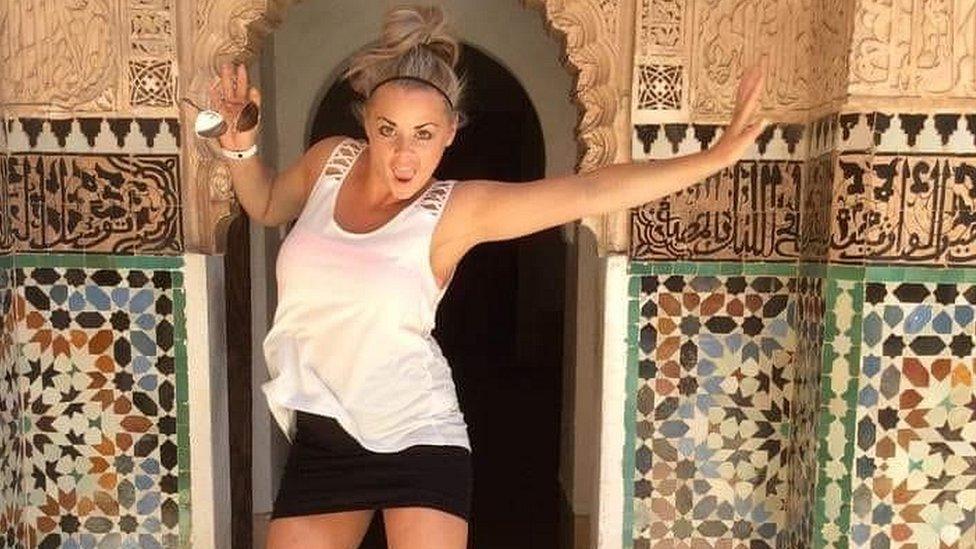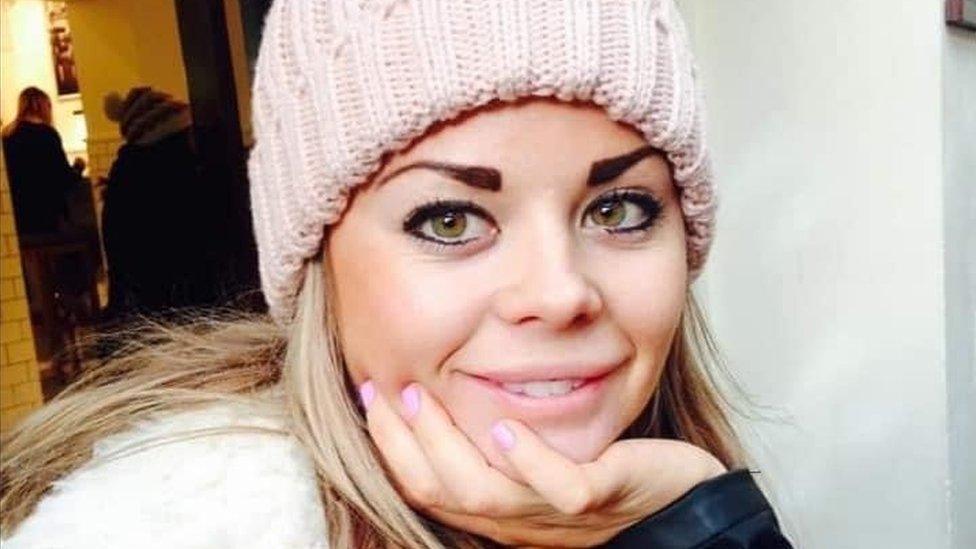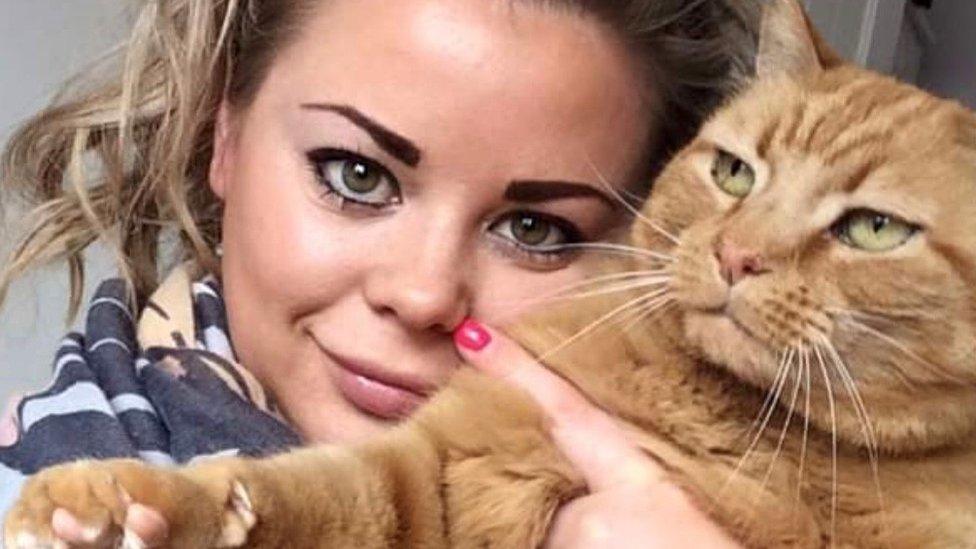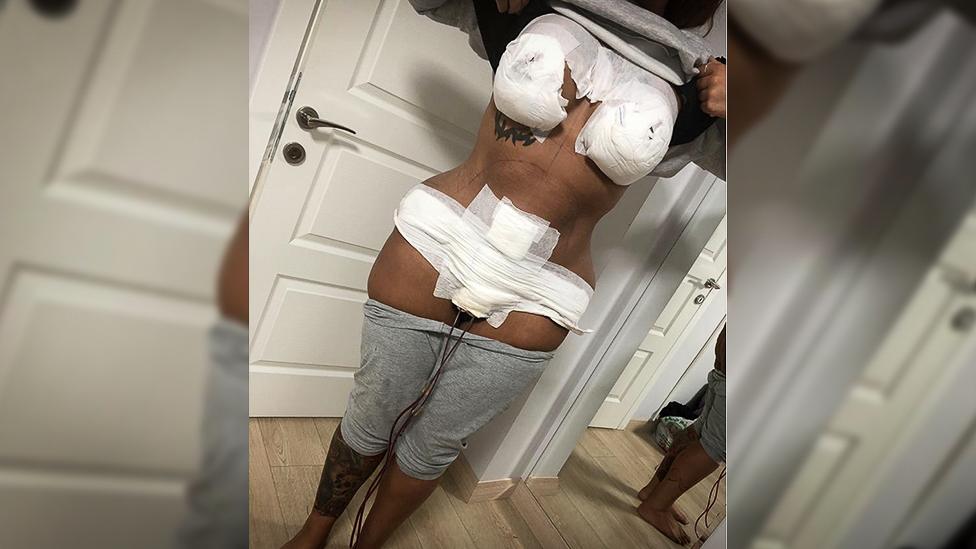BBL surgery: Woman who died in Turkey 'not told of risks'
- Published

Melissa Kerr died during cosmetic surgery at a Turkish hospital in 2019
A woman who died during a buttock operation in Turkey was not given enough information to decide on the safety of the surgery, a coroner said.
Melissa Kerr, 31, from Gorleston, Norfolk, died at the private Medicana Kadikoy Hospital in Istanbul, in 2019.
Coroner Jaqueline Lake said she would be writing a report for the health secretary to try and prevent further deaths from this "risky" procedure.
The hospital disputed the "contention" there was "inadequate information".
Ms Kerr had gone abroad to have what is commonly referred to as a Brazilian butt-lift or BBL, the Norwich inquest heard.

Melissa Kerr's family hope others will avoid "cosmetic tourism"
In a statement, Ms Kerr's family said they were devastated.
"We hope in the future individuals give proper consideration before travelling to Turkey for cosmetic tourism," they said in a prepared statement.
The Norwich inquest was told Ms Kerr, a psychological well-being practitioner at mental health charity Mind, was "self-conscious" about her appearance.
The inquest was told Brazilian butt-lift operations carried the highest risk of all cosmetic surgery procedures.
The UK has an agreed moratorium on carrying out such operations due to the dangers involved, expert witness and plastic surgeon Simon Withey said in a report for the inquest.
Mr Withey said if the risk of the procedure had been explained to Ms Kerr before she had financially committed to the procedure she would not "in all probability" have gone through with it.
On 19 November 2019, a day after arriving in Turkey and paying £3,200 in cash, she underwent a "limited" pre-operation assessment before surgery.
The operation was carried out by Dr Yakup Duman, an aesthetic and reconstructive surgeon who was also said to be a visiting doctor, the inquest heard.
Fat was harvested using a liposuction process from her jowls, thighs and abdomen and inserted into her posterior.
It was during the re-injection of the fat, deep into her buttock muscle tissue, that Ms Kerr suffered a fatal clot that had travelled to her lungs.
The inquest was told that if material was injected too deep into muscle tissue there was a risk of it travelling to other areas of the body.
Ms Kerr had been in theatre for more than three hours when efforts were made to resuscitate her, documents from the Turkish hospital said. She died a short time afterwards.

A prevention of future deaths report is to be sent to the health secretary to try and warn others about travelling to Turkey for plastic surgery following Melissa Kerr's death
Ms Kerr had no known health conditions according to her UK GP and she had undergone a breast augmentation 10 years previously, without any issues.
Recording a narrative conclusion, the coroner said Ms Kerr died after cosmetic surgery.
She recorded her cause of death as a pulmonary thromboembolism and fat thromboembolism, external; a blocked blood vessel in the lung.
Referring to her report for the secretary of state, Ms Lake said she was "concerned patients are not being made aware of the risks or the mortality rate associated with such surgery".
She added, while the UK government had no control over what happens in other countries,"the danger to citizens who continue to travel abroad for such procedures continues... and I'm of the view future deaths can be prevented by way of better information".
A spokesperson for Medicana said: "We were deeply saddened by the tragic death of Ms Kerr in 2019, following complications during surgery at one of our Turkish hospitals.
"We wholly reject the contention that Ms Kerr was provided with inadequate information to make an informed decision about the procedure she travelled to Turkey for.
"Following a thorough pre-procedure assessment, Ms Kerr signed several consent forms confirming that she understood the risks, which included the rare complication which led to her death.
"Medicana is committed to providing the highest standards of clinical care and patient safety. Our processes are continually reviewed, and we will continue to work with the Turkish Health Authority to make any changes deemed necessary to protect the reputation and integrity of Turkish healthcare."

Follow East of England news on Facebook, external, Instagram, external and X, external. Got a story? Email eastofenglandnews@bbc.co.uk, external or WhatsApp us on 0800 169 1830
Related topics
- Published28 February 2020
